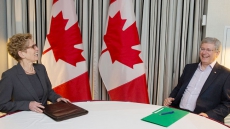OTTAWA — The federal finance minister raised eyebrows last week by publicly sharing his opinion on monetary policy — not necessarily because of his view on the matter, but because some believe he ventured too far onto the Bank of Canada's turf.
In response to a reporter's question, Joe Oliver said the policy measure known as quantitative easing was "not on the table" as a response to Canada's ongoing economic downturn.
The comment has prompted questions about whether the territorial line between the Conservative government and the central bank has been blurred.
Technically, it's Bank of Canada governor Stephen Poloz's call whether to implement quantitative easing, where central banks buy government assets and other securities to boost the supply of money.
"I thought that Minister Oliver overstepped when ruling out (quantitative easing) because it's not his decision," said Ian Lee, an economics professor at Carleton University's Sprott School of Business.
"You may think that, you may privately say that, but that's not the sort of thing I think the minister of finance should be saying. You know, just respect the sensibilities of the two positions."
Lee, however, noted that while the Bank of Canada is supposed to be free to make its own decisions without the government's input, the governor likely feels pressure to follow the finance minister's lead.
The finance minister, after all, is the governor's boss, he noted.
A clash of opinions that leads the finance minister to overrule the central bank governor can have big consequences.
"The governor of the Bank of Canada has two choices: either he resigns or he bows down to the government because they are elected and they have the electoral legitimacy which of course an appointee does not have," Lee said.
"But generally the monetary side tries to keep its distance from the finance side and vice versa just because it can really roil markets and roil your currency markets."

Conflicting views between a Bank of Canada governor and the government are not unprecedented — and have even led to a high-profile resignation.
Former governor James Coyne was forced to step down in 1961 after refusing to adopt the Diefenbaker government's expansionist monetary policies. The controversy, known as the Coyne Affair, is recognized as a key event that made the helped make the bank more independent and transparent.
The dispute also inflicted political wounds on Diefenbaker's Tories, Lee said.
"When you start mucking about with monetary policy too overtly, it can blow back on you and cause great damage," he said.
Oliver is not the only Harper finance minister to wade into the debate on the controversial measure of quantitative easing.
In October 2013, then-finance minister Jim Flaherty told reporters he never supported quantitative easing by the U.S. Federal Reserve, even though he appeared to back the move in 2010.
At the time, Flaherty's strong stance on the issue appeared to reveal a disagreement with Poloz.
Testifying before the House of Commons that same month, Poloz admitted any decision on quantitative easing would be a "team" effort between the central bank and the finance minister.
John Penner, a spokesman for Oliver's office, wrote in an email Sunday that the bank's policy states it would "co-ordinate with the federal government if it were considering quantitative easing."
Stephen Gordon, an economics professor at Laval University in Quebec City, said comments from finance ministers on matters of monetary policy are "worrisome."
"You start hearing this point more than once and from more than one finance minister, you start to wonder," Gordon said.
"If the Bank of Canada decides that it is a good idea, does that mean (the finance minister) is going to bring down the hammer and say, 'No, that's it, you're fired'?"
CIBC chief economist Avery Shenfeld said the Bank of Canada governor has less independence than the chair of the U.S. Federal Reserve, who cannot be forced to quit over policy decisions.
Federal Reserve chairs are sometimes openly criticized by the president, he added, while in Canada the government and governor are supposed to be on the same page, at least in public.
But Shenfeld said Bank of Canada governors maintain some freedom because any government move to replace them would be a "rare, shocking event."
"They would take flak for that," Shenfeld said, referring to the public response.

"There's obviously political consequences for having a public disagreement with the central bank governor."
As for Oliver's remarks on quantitative easing last week in Toronto, Shenfeld said the Bank of Canada's economic forecast isn't dire enough to make a case for the measure anyway.





